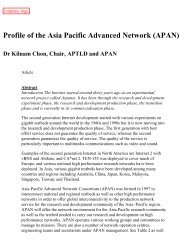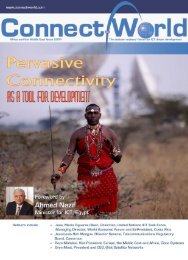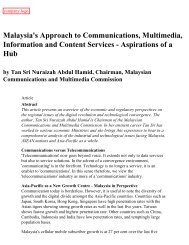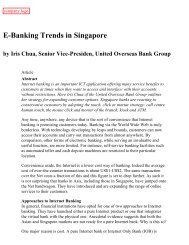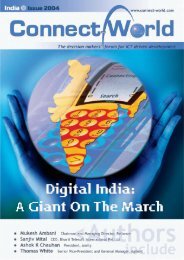Contents - Connect-World
Contents - Connect-World
Contents - Connect-World
You also want an ePaper? Increase the reach of your titles
YUMPU automatically turns print PDFs into web optimized ePapers that Google loves.
Regional Development–Wireless Broadband<br />
Broadband wireless, people and the economy<br />
by Guy J. Kelnhofer III, President and CEO, NextNet Wireless, Inc<br />
Asias explosive growth, due partly to its Internet driven integration into the global economy,<br />
has fuelled job creation. These high-paying jobs have stimulated the migration of<br />
workers to regions with the best essential services and jobs, bringing crowding and overloading<br />
the service structures in these regions. These jobs are terrific for economies and<br />
people, but threaten traditional family structures and debilitate the local economies of<br />
the regions left behind. Wireless Broadband can inexpensively connect these regions and<br />
help reverse this decline.<br />
Guy Kelnhofer III is President and CEO of NextNet Wireless and serves on the Board of Directors of the<br />
Wireless Communications Association. Before joining NextNet, Guy served as chief operating officer at<br />
Dataradio COR Ltd., as General Manager, Director of International Sales and Director of International<br />
Sourcing at E.F. Johnson Company and as Chief Executive Officer of Medical and Electronic Technology<br />
Exporters, Inc. Mr Kelnhofer is a graduate of Nankai University, Tianjin, Peoples Republic of China.<br />
Unique problems and<br />
opportunities<br />
The Asian broadband market is huge<br />
and still swiftly growing. Nearly half of<br />
the worlds people live in this region,<br />
with population growth among the<br />
highest in the world.<br />
Many Asian economies are booming,<br />
bringing with this growth intense<br />
needs for Internet accessparticularly<br />
broadband access.<br />
Clearly, high-speed Internet access is<br />
a crucial element in the strategy of<br />
Asian businesses. Broadband Internet<br />
access enables small firms in<br />
Indonesia, for example, to market in<br />
Europe or the US effectively.<br />
Asian firms with broadband Internet<br />
access increase their opportunities to<br />
compete in the global marketplace.<br />
South Korean residents enjoy one of<br />
the highest penetration ratesmore<br />
than 60 per centof broadband access<br />
in the world. Arguably, its focus on<br />
broadband access is a prime component<br />
of South Koreas successes in<br />
export industries ranging from electronics<br />
to automobiles.<br />
India is rapidly becoming the hightech<br />
outsourcing choice for US and<br />
European business. The city of<br />
Hyderabad is nearly as well known as<br />
Silicon Valley.<br />
These opportunities, while exciting,<br />
bring problems and disparities to<br />
Asian economies and people.<br />
Burgeoning growth fuels job creation,<br />
happily often in high paying industries.<br />
However, most job growth occurs in<br />
areas with the best essential services<br />
in place; this accelerates the migration<br />
of people seeking opportunity to these<br />
areas, bringing increased crowding<br />
and load upon these services.<br />
Rapid influxes of populations to and<br />
from cities and frequently within<br />
cities, create problems ranging from<br />
road crowding to overloaded utility<br />
services. Even the delivery of mail is<br />
impacted.Local school systems struggle<br />
to adapt, with minimal budgets, to<br />
exploding student populations.<br />
Despite these problems, this type of<br />
growth is terrific for economies and<br />
people.<br />
However, what of those left behind<br />
Even in South Korea, where broadband<br />
adoption is strong, large portions<br />
of the country have little or no<br />
broadband access.<br />
It is common for large underserved<br />
areas to exist within cities, even large<br />
cities. This problem is magnified in<br />
countries where broadband coverage<br />
is less prevalent. What are the human<br />
costs for inadequate broadband<br />
access<br />
This migration of populations disrupts<br />
the traditional family units that are so<br />
important in Asian cultures. In addition<br />
jobs are lost in the underserved<br />
neighborhoods and towns left behind.<br />
These growth areas and economies<br />
may falter. Tax bases drop causing<br />
disruption and degradation of essential<br />
services. It becomes harder for<br />
smaller businesses, which traditional-<br />
36



